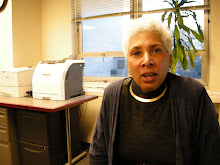Jim Crace at the Artists Club, Gramercy Park South, New York City.
The Carleton Book Club was hosted by Karen Kukowski and David Diamond (members of the Artists Club) for a talk by Jim Crace on Thursday May 29, 2008.
Jim Crace had arrived in this Time Zone just hours before from a Great Britain that consumes large quantities of American culture: magazines, movies, music, electoral politics. Even in remote villages of Cambodia, where he traveled recently there were posters for Nike and photos of a pop music star. American culture has a global persona. This village lacked basic amenities including education. This love hate relationship with the US is the foundation for the book he reads from tonight Pesthole.
He began writing as a journalist. Quickly he learned that an editors’ response to ‘writers block’ was not 'submit it whenever you can.' More likely this response was "You are sacked." He described disciplined work habits that might include sitting in his garden all day. He said that he has always completed his novels on time.
The title of his most recent novel Pesthole is chiseled on a building on the Isle of Sicily. The Isle of Sicily is located thirty miles from the main land; for immigrants of the past a destination for a new life. The events on this island have the mood of dashed hope:"the fodder of great fiction." A family vacation spot is near, the Isle of Marettimo. He told us the history of the island where immigrants were quarantined and ignored for a mere rosaceous complexion presumed to be a contagious disease.
He told us so many things; perhaps we didn't expect to hear:
About the three languages: King's English; Oxford; BBC
Why he wrote the book Being Dead.
What were the funeral arrangements for his father.
His opinion of the America political candidates
What he thought of On The Road, McCarthy
He creatively presented the Gestalt of his persona as a writer and as a citizen. He is a citizen of the world concerned about how our awareness of nature has waned as we manufacture goods for our consumer driven culture. What will the "medival future" think of the many objects of modern technology? He touched the lecturn's lamp and the microphone. He holds up a shiny six inch bolt with a washer that smoothly spins on its’ threads. Then in his left hand a similar bolt found in his garden demonstrating years of rust, useless. From Pesthole he read of the shaven female character, Margaret who cherished a nickel and a penny. Did she really have the "flux?"
Jim Crace suggests that readers make an erroneous coupling of author with book. He came to America to tell us that he is really a nice, likeable guy who just happens to scribe novels such as Quarantine and Being Dead. (Both of which have been recently read by the Carleton College Book Club) He gardens, plays tennis and spends time with family and friends. He writes about death but he is quite an optimistic chap. He is quoted describing Pesthole as "an unambiguously optimistic book." http://www.jim-crace.com/ He doesn’t consider these subjects morbid but simply a depiction of the natural world that all the other millions of species clearly comprehend. What a surprise if our species is the conscious one; why do we not acknowledge that the natural world is what is controlling our lives. The perspective that the subject is morbid perhaps comes from the readers' pessimism; it is not the author's. Any scholar or observer of natural history reminds us that death is all around us; the very compost of the earth. His writing combines the informative with the hideous.
For many in the audience who had read Being Dead the recollection of the couple lying of the beach, bodies disintegrating lacked lightness. Yet listening to Jim Crace it was easy to recall the other parts of the story: the earlier carefree life of the couple studying the elusive stickler moth; the daughter going on as she incorporated the tragedy into her life. In China the published title was "Love on the Beach."
His mother and father did not yell at each other; his childhood does not make for marketable fiction.
Jim Crace comes from generations of atheists. His father gave very strict instructions for the family on his internment. The family complied: no hymns, no words and no spreading of his ashes. The last is the only task Jim Crace regrets ignoring. As a citizen of the world he understands the frivolity and function of religion. If there was a reason for writing Being Dead he suggests this was his attempt to compose a narrative to comfort the atheists in the style that religion wraps a compelling story around the exigencies of life and death. A member in the audience asked if he thought most readers would appreciate this intent? He sighed, "no.”
Subscribe to:
Post Comments (Atom)

No comments:
Post a Comment